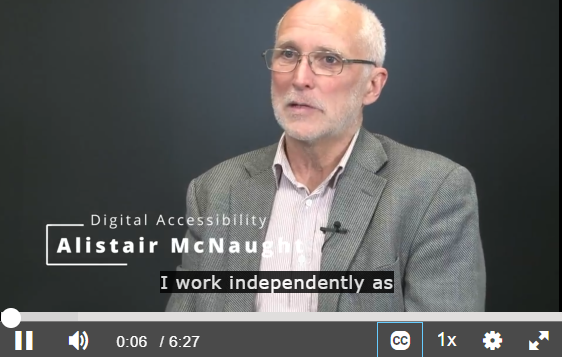
June 27, 2023, by Helen Whitehead
How do we implement Digital Accessibility?
One of our keynote speakers at the Digital Accessibility conference on 29th June is Alistair McNaught. Alistair has been supporting HE and FE (and other) organisations on improving accessibility for many years. He was a keynote speaker at the University’s Teaching and Learning Conference in 2022 where he spoke about the habits of highly accessible people: you can see his video in this previous blog post. I asked Alistair a few questions about where we go from here with digital accessibility and why the conference is important.
Why is the Digital Accessibility conference needed?
Alistair: The conference is a great opportunity to move the sector from the “What” questions to the “how” questions. One of the most exciting aspects of the last few years has been the emergence of home-grown expertise. The conference is a great opportunity to bring together that expertise so institutions can learn from one another. Its about moving to the next phase. We know what we need to do. We know everyone is involved in different ways. We know it affects everyday practice. Now it’s about working out how we are going to implement it, which models of leadership, training, and quality assurance will prove the most effective and sustainable?
Why should academics care about accessibility? What are the advantages for them?
Alistair: Covid was a wake-up call for organisations. Staff and student digital skills were tested to the limit, and it became clear that digital capability is not a “nice to have”; it’s a fundamental requirement for teaching and learning in the 21st century. Once you accept digital capability as part of a teaching and learning skill set, it’s a small step to recognise that the way digital resources are created and organised actually matters. There are efficient ways of doing things digitally, simple habits that make resources easier to use and reuse. But if you don’t know the right way, you create barriers that impact on users. The accessibility regulations are about removing barriers created by uninformed digital practices.
Alistair: Accessible content makes everyone more efficient. Furthermore, some academic publishers require authors to submit accessible manuscripts. So, it’s not just about teaching, it’s research, publication and administration too. All three require effective skills in digital communication. Accessibility gives you that edge. If your content is accessible to disabled readers, it is more effective for everyone.
Alistair and Amy Low’s keynote is:
Five years on – are we there yet?
Amy Low from AbilityNet and Alistair McNaught from McNaught Consultancy Ltd have uniquely privileged access to the inner workings of many HE and FE organisations from their joint delivery of the Accessibility Maturity Model for Education. What is the real state of digital accessibility in the UK? What are the levers for change and where are the missing links? In this roundup at the end of the day they’ll distil their experiences supporting the sector, share the secrets of successful organisations, and help identify some of the priorities that will help preserve your sanity and stress levels while maintaining momentum.
Few of us in the sector will be “there” yet, but this is a good chance to see if you and your organisation are on the right road.
We look forward to hearing more from Alistair (and Amy) at the conference.
No comments yet, fill out a comment to be the first

Leave a Reply